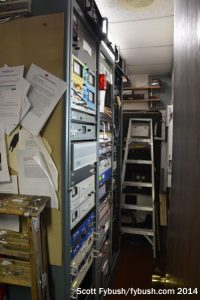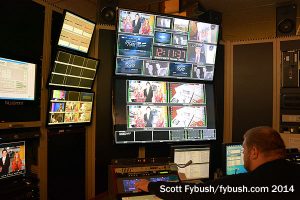NorthEast Radio Watch 12/8/2025: Cichon’s Back in Buffalo
In this week’s issue… Veteran newsman returns - Remembering NY's Leitner, RI's Jones - CT AM saved - Maine AM moves - "Indie" adds suburban signals
Text and photos by SCOTT FYBUSH
All of us here in upstate New York labor under the impression (from outsiders) that we live under a blanket of snow year-round. That was just about true this winter – but the real truth is that some parts of upstate are much snowier than others.
In particular, the area known as the Tug Hill Plateau, on the eastern end of Lake Ontario, is as snowy as it gets – to the tune of more than 200 inches of snow this winter (and perhaps it’s not even over yet.) And if you turn on the radio or the TV on the Tug Hill Plateau, most of the stations you’ll hear and see come from a few miles north in Watertown, the commercial hub of New York’s North Country.
We tend to get up there in the summer, when the roads are clear and the weather’s pleasant, and the summer of 2014 gave us three chances to drive through Watertown and stop to see some of the sites.

Watertown went from a no-radio town to a two-station town within the space of just a couple of months in early 1941, and this week we look at everything that spun off from the second of those stations.
WWNY signed on at 790 on the dial in April 1941, licensed to the Brockway Co., owner of the Watertown Daily Times, then and now the city’s print voice. Brockway and the Times put an FM on the air at 100.5 during the first FM boom after the war, but soon turned their attention instead to television. In 1954, WCNY (Channel 7) signed on, licensed to the nearby community of Carthage and operating from a studio/transmitter facility up in the hills that rise up east of Watertown at the edge of the Adirondacks.
WWNY radio wasn’t co-located with the TV for most of its history, operating from downtown studios and a transmitter site south of Watertown, alongside what would eventually become the I-81 right-of-way.
We’ll come back to the TV side of things in a moment, but first let’s follow radio along: when the cross-ownership was broken up in 1980, the radio side became WTNY, operating from the studios on Mullin Street near downtown where it remains today.
Today, however, WTNY is just one signal in what’s become a four-station cluster. It spawned a new FM sister in 1986, WTNY-FM on 93.5, and then in the era of duopoly and clustering it added what had been a competing AM-FM pair, WOTT (1410) and WCIZ (97.5). A series of call and format shuffles moved the WCIZ calls and rock format down the dial to what had been WTNY-FM, and that signal eventually shifted one notch down the dial to 93.3, where it plays classic rock today as “Z93.”
The huge 97.5 signal, which comes from a tower right next door to channel 7 up on the hill, became “Froggy 97,” playing country as WFRY with enormous ratings success. Its AM sister on 1410 took the WCIZ calls for a bit and then went sports as WNER, “the Winner.” The old WOTT 1410 transmitter site on Gifford Street came down a few years back, and now the 1410 signal is diplexed on the 790 towers on Ives Street.
The Mullin Street facility, designed for just one station, is a bit of a tight squeeze now for all four stations, today owned by Oklahoma-based Stephens Media Group. The studios are lined up in an L-shape along a side and back wall of the building: WTNY’s news-talk studio includes a nice camera setup for video streaming of the local morning show, WNER is tucked into a small studio next door, WFRY gets a cozy room with a window and WCIZ gets a corner space that I believe was the original WTNY main air studio.
It’s just a few blocks from Mullin Street to the boxy concrete building that’s the current home of channel 7. Brockway built this facility around 1970 as the new home of both WWNY radio and channel 7, which had by then been renamed WWNY-TV. (The WCNY calls went to Syracuse for the 1962 debut of its educational TV signal on channel 24.)
There’s not much 1970s left in channel 7’s Arcade Street facility today. Enter through the first-floor lobby (there are offices upstairs leased out to other tenants), turn right through the newsroom, and then right again to see the studio, where a spiffy new set was recently put into place for HD newscasts. (Its predecessor had been in place since the mid-1990s, when it was removed from Boston’s WBZ-TV after just a few years in service there.)

WWNY’s technical plant is mostly in the front of the building these days: across from the studio, the production control room looks out to Arcade Street past a wall of monitors.
On one side of the room, two sets of shelves hold artifacts from channel 7’s six decades on the air, including old film cameras, projectors and early videotapes.
Master control is in the next room over; today, that means not only WWNY’s main signal, which carries CBS, but also the market’s Fox affiliate, WNYF, which operates on a pair of low-power TV signals in Watertown and Massena and on WWNY’s own 7.2 subchannel.
For much of its history, channel 7 was the only game in town, offering not only its primary CBS programming but also a secondary affiliation with NBC and ABC. The 1970s brought a second station to town: the St. Lawrence Valley Educational Television Council, which had been producing some programming that ran on WWNY-TV, got its own license for WNPE (Channel 16) in Watertown and WNPI (Channel 18) up in Norwood. The new station originally took over WWNY-TV’s old Champion Hill studios after channel 7 moved downtown to Arcade Street, but soon ended up on the edge of town on Arsenal Street, the busy link between downtown and I-81. (In later years, channel 16 grabbed the “WPBS-TV” calls, paying an AM station in Georgia to share that callsign.)
A second commercial signal appeared in the 1980s: ABC affiliate WFYF (Channel 50), later WWTI, tried to challenge WWNY’s dominance of the market. From studios in the Stateway Plaza, at I-81 and Arsenal Street, channel 50 at one time offered a fairly extensive lineup of local news; eventually, that dwindled to local headlines in what’s otherwise a simulcast of Syracuse ABC affiliate WSYR-TV (Channel 9).
Thanks to WWNY’s Jeff Shannon and the nice folks at Stephens Media Group for the tour!

As we announced a few weeks ago, the 2026 edition of the Tower Site Calendar will be the last.
We began publishing it 25 years ago, and the broadcast landscape is radically different now.
Radio World just ran an excellent article about us if you want to know more.
Once it’s gone, that’s it. We won’t be printing any more.
Thank you to everyone who saw our announcement and rushed to buy it. We appreciate you.
(There are some calendars from previous years if you want more of a tower photo fix — all under $5.)
But don’t wait to get this year’s Tower Site Calendar — buy it now!
We are selling the Broadcast Historian’s Calendar again this year, but we have that in an even smaller quantity — definitely don’t hesitate for that.
And visit the Fybush Media Store to check out our selection of books and videos, too!
Next week: Geneva, NY, 2014
In this week’s issue… Veteran newsman returns - Remembering NY's Leitner, RI's Jones - CT AM saved - Maine AM moves - "Indie" adds suburban signals
In this week’s issue… Scripps stations face takeover - Sinclair moves more affiliations - CT stations sold - Maine AM surrendered - Remembering WVBR's Shapiro, WABC's Morgan
In this week’s issue… CT TV legend succumbs to cancer - Remembering PA's Adams - FCC still stalled by shutdown - Pittsburgh morning host exits
In this week’s issue… FCC faces reopening challenges - Veteran Boston anchor retires - Morning shift in Toronto - NYC FMs expand reach